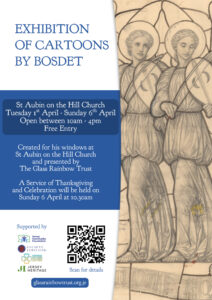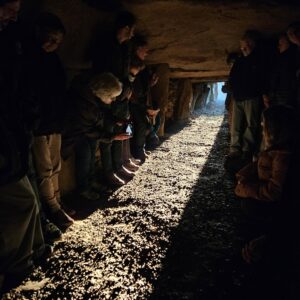
We continue our series of article in Jèrriais – Jersey’s own traditional native language. The ‘frouque’ in question is a digging fork, rather than a table fork. An English translation follows. This contribution comes from Rod McLoughlin
Bouônjour tout l’monde,
Ch’est-i’ vrai qu’un Angliais, tchi d’meuthe à St Hélyi, nouos êcrit eune lettre Jèrriaise ? J’peux m’înmagînner les réactions d’mes anmîns au Vouêt d’l’île ! Nannîn, qu’i’ disent : la terre dé Jèrri né comprend pon l’Angliais, s’lon l’diton qu’tout le monde sait bein ! Ch’est la fîn du monde !
Mais ch’est bein vrai et, aniet, j’voudrais vouos explitchi pouortchi qu’chest împortant d’êprouver à apprendre not’ langue dé Jèrri, même si les gens la pâlent auve un accent tchi sembl’ye êtrange ès cheins d’St Ouën ou St Martîn.
La raîson pus împortante tch’ explyique m’n întéthêt dans la langue ch’est l’identité d’not’ île. I’ faut qu’tout l’monde aient l’tchoeu neu d’Jèrri. Quand j’‘tais mousse, mes pathents èrmuitent en Jèrri et j’pâssis ma vie entchiéthe ichîn. Aniet, ieune des choses que j’aime lé mus ch’est d’êcouter les difféthentes vouaix dans les boutiques – lé Portûndgais, et l’ Polonais mais tchiquefais l’Espangno ou l’Roumain étout.
Bein seux, y’a chînquante ans, nou soulait ouïe les gens tchi pâlaient l’Jèrriais dans l’marchi. Aniet, tristément, ch’ n’est d’aut’ habituel. Mais ch’est împortant qu’au même temps qu’nou-s-attchil’ye les difféthentes nâtionalités, nou célébre les sèrtes dé Jèrri tchi font not’ île spéciale. En êtudgiant la langue Jèrriaise, j’voudrais faithe ma propre contribution.
Mais, y’a eune aut’ raîson pus pèrsonnelle tch’ explyique m’n întéthêt. Quand man péthe arrivit en Jèrri, i’ voulait qu’les Jèrriais sachent qu’i respectait lus tchultuthe. Don, i’ décidit d’aller ès classes dé Jèrriais. Iun d’ses anmîns ‘tait M. Don Pallot – un vrai Jèrriais – tchi fondit l’mûsée dé suage auve des locomotives historiques dans la pâraisse de la Trinn’té. M Pallot soulait env’yer des m’ssages en Jèrriais à seule fîn qu’man péthe piêsse pratitchi san Jèrriais siez li.
Aniet, ch’est y’a pus d’quarante ans, mais jé m’rappelle hardi bein iun d’ses m’ssages. Ch’tait en Dézembre et man péthe r’gardait les cartes dé Noué tch’il avait r’chues chu matîn-là, quand i’ c’menchit à rithe en liêthant la carte à M. Pallot. D’vant qué j’piêsse vous raconter san m’ssage, i’ faut dithe deux’trais mots entouor chu temps-là, pour les jannes gens d’aniet – comme not’ maitrêsse dé Jèrriais, par exempl’ye – tchi n’peuvent pon s’en rapp’ler.
Achteu, les gâzettes et la télévision nouos avèrtissent des dangièrs du change dans l’clyinmat et d’la cauff’thie globale, mais dans chu temps-là lé problième ‘tait la disette du pétrole. Man péthe pensait qu’la vie s’en allait changi – pon d’ boulants, pon d’avions, pon de transport hors l’île. En dgise dé tout ch’nna, i’faudrait trouver une vie pus sîmpl’ye, s’lon man péthe.
P’t êt’ qu’i’ ‘tait inspithé par un programme sus la télévision : « La Bouanne Vie » qu’nou peut r’garder acouo eune fais achteu. Ch‘est l’histouaithe d’un homme et sa bouonnefemme tch’ ont décidé d’vivre eune vie pus sîmpl’ye, sans luxes, auve un gardîn pliein d’lédgeunmes et d’annimaux.
Bein seux, ch’est une conmédie mais, pouor man péthe, lé sujet ‘tait tchiquechose hardi séthieux. Par exempl’ye, il acatit un livre tch’ explyitchait comment qu’nou pouvait convèrti not’ vaituthe en faîthant sèrvi d’la bouse dé j’va!
Èrtouônnons au sujet d’la carte dé Noué à M. Pallot. Ch’tait tchiquechose traditionnel auve un portrait dé Papa Noué sus san traîné à sièx chèrs du Nord. Malgré l’abat d’né, Papa Noué faîthait d’bouôns progrès, donc M. Pallot ajouôtit un m’ssage hardi sîmpl’ye : ‘Papa Noué n’a pon bésoin de pétrôle!’
Comme man péthe ‘tait heutheux! Èrchever une carte dé Noué en Jèrriais – vraiment, les gens d’Jèrri l’avait accepté ch’t’ êtrangi – et auve un m’ssage si êclaithi. S’il avait r’chu eune carte dé Noué d’la Reine Elizabeth II, i’ n’éthait pon ‘té pus rêjoui.
Man péthe mouothit y’a seize ans mais j’crai qu’i s’sait bein content d’saver qu’aniet san fis êprouve à apprendre la même langue quâsiment chînquante ans auprès ses efforts, et heutheux étout qu’nos excellents maîtres d’êcole travâlent auve des jannes êtudgiants dans nos êcoles pouor qué l’Jèrriais sait saûvé.
……………………………………………………………………………………………………………
Hello everyone,
Is that true that an Englishman who lives in St Helier writes a Lettre Jèrriaise? I can imagine the reaction of my friends in the west of the Island – that can’t be right: ‘Jersey soil does not respond to English ways’ according to the “diton” which everyone knows. It is the end of the world.
But it is true and today I want to explain why I think it’s important for people to try to learn Jerriais even if they speak it with an accent which will seem strange to those in St Ouen and St Martin.
The main reason that explains my interest in the language is the identity of our Island. Everyone should be proud of the Island. When I was a child, my parents moved to Jersey, and I have spent my whole life here. Today one of the things which I like most is to hear different voices in the shops – Portuguese and Polish but also sometimes Spanish or Romanian.
Of course, 50 years ago you used to hear people speaking Jèrriais in the market. Today, sadly, that’s not normal. But it is important that while we welcome many different nationalities to the Island, we also celebrate the things which make Jersey special. By studying Jèrriais, I want to play my own part in this.
But there’s another more personal reason that explains my interest. When my father came to the Island, he wanted Jersey people to know that he respected their culture. So, he decided to take Jèrriais classes. One of his friends was Mr Don Pallot – a real Jerseyman – who created the Steam Museum with old locomotives in the parish of Trinity. Mr Pallot would send my father messages in Jèrriais so that he could practise the language at home.
Today, it’s more than 40 years ago but I remember one of these messages very well. It was December and my father was looking at the Christmas cards he had received that morning when he began to laugh, reading Mr Pallot’s card. But before I tell you the message, I have to say a few words about the 1970s for the benefit of the younger generation, like our Jèrriais teacher, who can’t remember it.
These days the newspapers and television warn us about the dangers of climate change and global warming but in those days the problem was the shortage of petrol. My father thought that life was going to change – [there would be] no vehicles, no planes, no transport out of the Island. Instead of that, it would be necessary to find a simpler life, according to my father.
Perhaps he was inspired by the television programme The Good Life which we can watch again today. It is the story of a man and his wife who have decided to lead a simpler life without luxuries, with a garden full of vegetables and animals.
Of course, it’s a comedy but the subject was something very serious for my father. For example, he bought a book which explained how you could convert your car to run on horse manure.
Getting back to Mr Pallot’s Christmas card. It was something traditional with a picture of Father Christmas on his sleigh with six reindeer. In spite of the snow drift, Father Christmas was making good progress, so Mr Pallot added a simple message: ‘Father Christmas has no need for petrol’.
How happy my father was! To receive a Christmas card in Jèrriais – certainly the Jersey folk had accepted this foreigner – and with such an enlightened message. If he had received a card from Queen Elizabeth II, he couldn’t have been more overjoyed.
My father died 16 years ago but I think he would have been very happy to know that today his son is trying to learn the same language almost 50 years after his own efforts, and happy also that our excellent teachers are working with young students in schools so that Jèrriais is saved.




